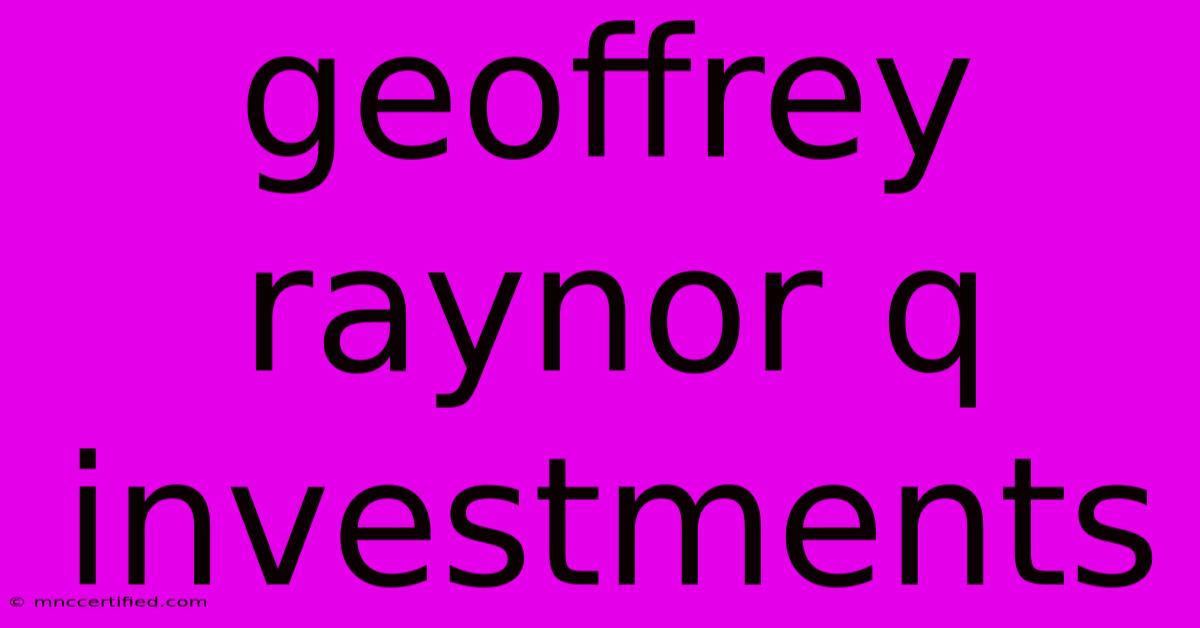Geoffrey Raynor Q Investments

Table of Contents
Geoffrey Raynor: Q Investments and the Power of Strategic Thinking
Geoffrey Raynor, a renowned professor at the London Business School and a leading expert in strategy, is less known for specific "Q Investments" than for his profound contributions to strategic thinking, particularly within the context of competitive advantage and resource allocation. While he doesn't have a publicly known investment firm named "Q Investments," his work directly informs how smart investors, businesses, and individuals approach resource allocation and strategic decision-making. This article will explore Raynor's key ideas and how they translate into practical investment strategies.
Understanding Raynor's Strategic Framework
Raynor's strategic framework doesn't focus on specific stocks or sectors but rather on the underlying principles that drive sustainable competitive advantage. His work emphasizes the importance of:
-
Industry Attractiveness: Raynor stresses the crucial role of selecting industries with favorable characteristics, offering potential for high profitability and sustainable growth. This involves a deep understanding of industry dynamics, competitive intensity, and potential disruptions. For investors, this translates to identifying sectors poised for growth and avoiding those plagued by intense competition or declining demand.
-
Competitive Advantage: Simply being in a good industry isn't enough. Raynor highlights the necessity of possessing a sustainable competitive advantage – something that rivals find difficult to imitate or overcome. This could manifest as superior technology, a strong brand, unique operational efficiencies, or a highly skilled workforce. Investment decisions should favor companies with clear, defensible competitive advantages.
-
Resource Allocation: Efficient resource allocation is paramount. Raynor's work emphasizes the importance of focusing resources on areas where they can generate the highest returns, aligning investments with strategic goals. This necessitates a disciplined approach to capital allocation, avoiding distractions and focusing on core competencies.
-
Strategic Clarity: A well-defined strategy is essential. Raynor's teachings underscore the need for a clear understanding of the company's goals, target market, and competitive landscape. This clarity allows for more effective decision-making and resource deployment. Investors should look for companies with strong strategic direction and management teams capable of executing their plans.
Applying Raynor's Principles to Investment Decisions
How can investors practically apply Raynor's principles? Here are some key takeaways:
-
Industry Analysis: Before investing, conduct thorough industry research. Analyze market size, growth potential, competitive landscape, and regulatory environment. Focus on industries with high barriers to entry and less intense competition.
-
Competitive Advantage Assessment: Evaluate a company's competitive advantages. Look for evidence of strong brands, unique technologies, cost leadership, or other sustainable competitive moats. Consider the company's intellectual property and its ability to innovate.
-
Management Quality: Assess the competence and experience of the management team. A capable and well-aligned management team is crucial for executing a successful strategy and allocating resources effectively. Look for a consistent track record of sound decision-making.
-
Financial Analysis: Analyze a company's financial statements, paying close attention to profitability, cash flow, and debt levels. This will help you assess the company's financial health and its capacity for future growth.
-
Long-Term Perspective: Raynor's principles emphasize a long-term perspective. Avoid short-term speculation and focus on companies with sustainable business models and the potential for long-term growth.
Conclusion: Investing with Strategic Insight
While Geoffrey Raynor doesn't directly endorse any specific "Q Investments," his strategic framework provides a powerful lens through which to view investment opportunities. By focusing on industry attractiveness, competitive advantage, resource allocation, and strategic clarity, investors can significantly improve their chances of success. His work emphasizes a thoughtful, long-term approach to investing, moving beyond short-term market fluctuations to focus on building a robust and sustainable investment portfolio. Applying these principles requires diligent research, critical thinking, and a disciplined investment approach.

Thank you for visiting our website wich cover about Geoffrey Raynor Q Investments. We hope the information provided has been useful to you. Feel free to contact us if you have any questions or need further assistance. See you next time and dont miss to bookmark.
Featured Posts
-
Broome Co Operative Insurance
Nov 29, 2024
-
Bears Harlow Trolled Nfl Fans Hype Shaboozey
Nov 29, 2024
-
Car Dealership Insurance Cost
Nov 29, 2024
-
Watchdog Probes Kruger On Dying Funds
Nov 29, 2024
-
Best Gold Coin For Investment
Nov 29, 2024